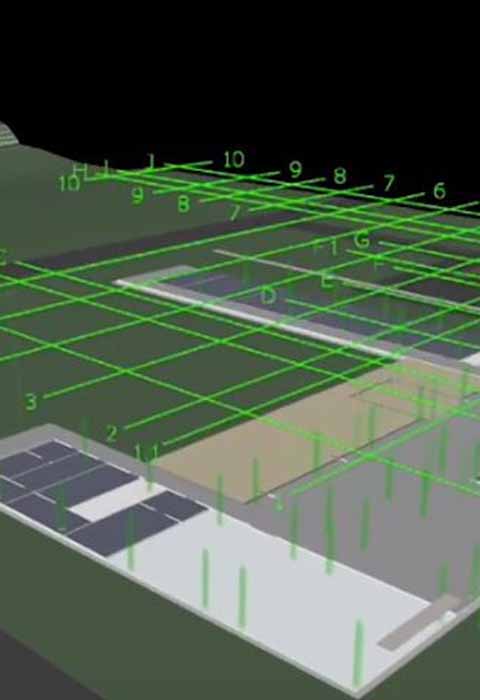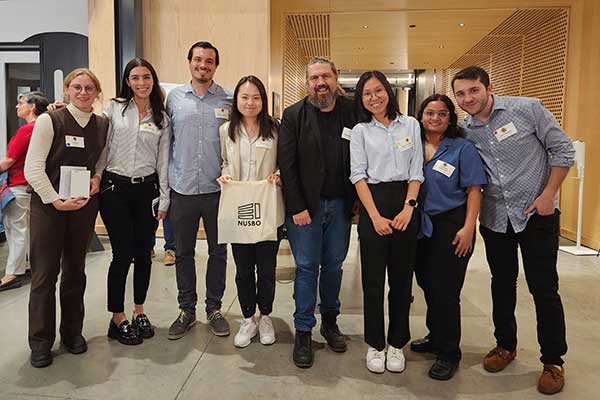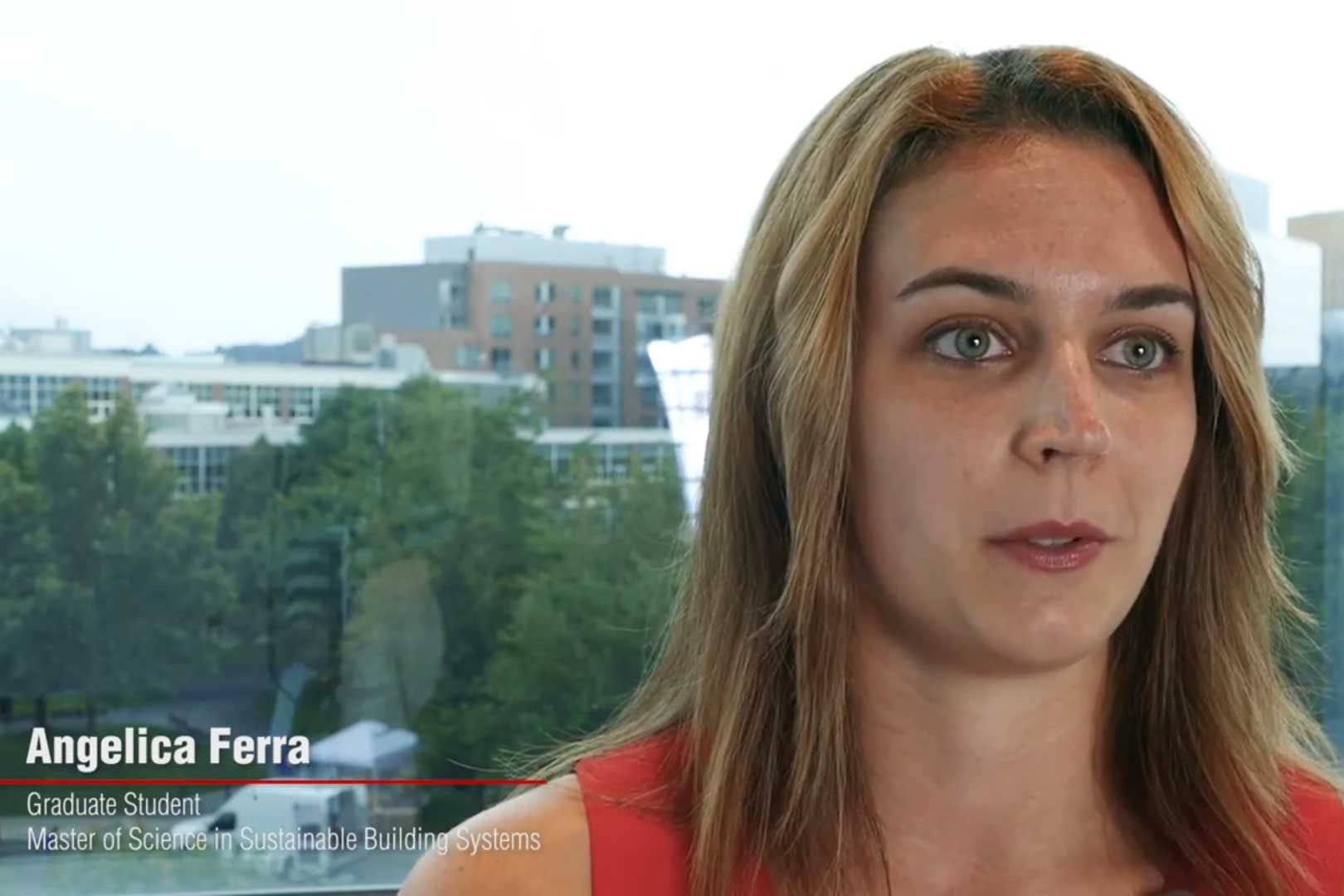
Master of Science in Sustainable Building Systems
Master of Science in Sustainable Building Systems
Overview
The Master of Science, MS, Sustainable Building Systems degree program integrates elements of an architectural engineering program with construction management while embracing the concepts of engineering sustainability as related to energy and materials usage and the effect on the environment. The master’s degree program focuses on the design and operation of buildings to provide a comfortable, healthy, and productive indoor environment with minimal energy and environmental impact.
Innovative Curriculum - MS in Sustainable Building Systems
Students have an opportunity to develop leadership and decision-making skills to implement sustainable building practices in either the private or public sectors in the global market.
Prospective students for this program are engineering, architecture, business or science majors, and industry professionals pursuing an industrial or public planning based career, who desire to gain cutting edge knowledge in sustainability practices for building systems development and its infrastructure.
The program is flexible to accommodate full-time students—who wish to proceed over a period of two to four semesters—and part-time students—who can complete the program requirements by taking one to two courses per semester, finishing the program in approximately four years.
Learning Outcomes
- Ability to identify, formulate, and solve complex engineering problems.
- Ability to explain and apply engineering principles.
- Compare definitions, select appropriate metrics, and evaluate claims of sustainability in the built environment by applying tools, methods, and skills relevant to the design and operation of sustainable buildings.
Graduate Certificates
Over 15 graduate certificates are available to provide students the opportunity to develop a specialization in an area of their choice. Certificates can be taken in addition to or in combination with a master’s degree, or provide a pathway to a master’s degree in Northeastern’s College of Engineering. Master’s programs can also be combined with a Gordon Engineering Leadership certificate. Students should consult with their faculty advisor regarding these options.
Gordon Institute of Engineering Leadership
Students may complete a Master of Science in Sustainable Building Systems in addition to earning a Graduate Certificate in Engineering Leadership. Students must apply and be admitted to the Gordon Engineering Leadership Program in order to pursue this option. The program requires fulfillment of the 16-semester-hour curriculum required to earn the Graduate Certificate in Engineering Leadership, which includes an industry-based challenge project with multiple mentors. The integrated 32-semester-hour degree and certificate will require 16 hours of advisor-approved sustainable building systems technical courses.
Experiential Learning
Northeastern combines rigorous academics with experiential learning and research to prepare students for real-world engineering challenges. Northeastern is an R1 research institution, rated among universities with the highest research activity.
The Cooperative Education Program, also known as a “co-op,” is one of the largest and most innovative in the world, and Northeastern is one of only a few that offers a co-op program for graduate students. Through this program, students gain up to eight months of professional experience employed in their field of interest as part of the academic curriculum, giving them a competitive edge upon graduation. The College of Engineering has over 3,000 co-op employer partners globally. Our dedicated team of co-op coordinators prepare students for the co-op experience through resume building, developing interview skills, and guiding professional development.
Program Goals
The graduates of the Master of Science (MS) in Sustainable Building Systems program should display a high level of engineering knowledge in a broad range of architectural engineering, civil engineering, and construction management, while embracing the concepts of engineering sustainability as related to energy and materials usage and the effects on the environment.
Graduates will have the base training necessary to lead efforts within companies to plan and implement sustainable practices for the design and operation of buildings, realize energy and materials efficiency improvements, and minimize environmental impact.
Upon graduation, students will have a theoretical background to the concepts behind the LEED (Leadership in Energy and Environmental Design) Green Associate examination.
Academic Advising
We have a variety of advisors to help make your graduate career a success, so use the link below to determine which one will help you the best.
Admissions & Aid
Ready to take the next step? Review degree requirements to see courses needed to complete this degree. Then, explore ways to fund your education. Finally, review admissions information to see our deadlines and gather the materials you need to Apply.
Student Experiences

Flexible, Interdisciplinary, and Industry-Aligned Sustainable Building Systems Program
Jose Velazquez, MS’24, sustainable building systems, worked full time while completing his master’s degree at Northeastern. Velazquez applied the knowledge he gained in class directly to his position at C&W Services.

Architecture Graduate Finds Sustainable Career Path
Sowdamini Ponnada, MS’25, sustainable building systems, leveraged Northeastern’s experiential learning opportunities and comprehensive curriculum to transform her passion for sustainability into a technical skill she could utilize in her architecture career. Upon graduation, she is joining her co-op employer full time as an early career sustainability consultant.

Pivoting From Biology to Sustainable Design With an MS in Sustainable Building Systems
Dane Brimmeier, MS’ 24, sustainable building systems, switched his career path from biology to sustainable design through academics, involvement in a professional student club, and co-op which led to a contracted full-time position.

Developing a Sustainability Career From a Mechanical Engineering Foundation
A master’s degree from Northeastern and a co-op at BR + A helped Tammy Ngo, MS’23, sustainable building systems, change her career trajectory from mechanical engineering to sustainable building design.

